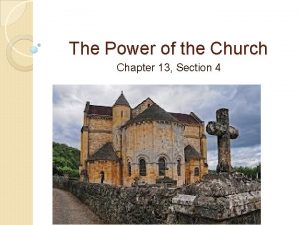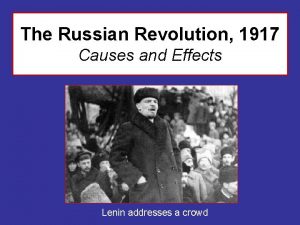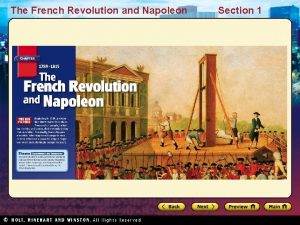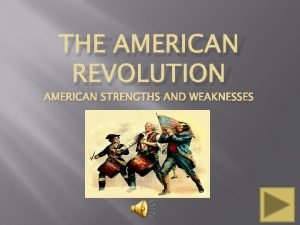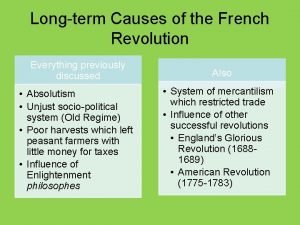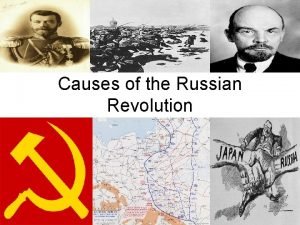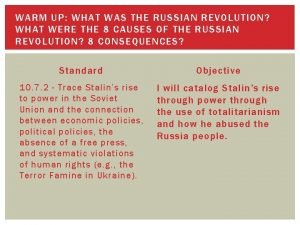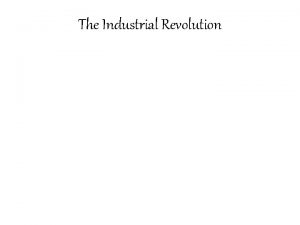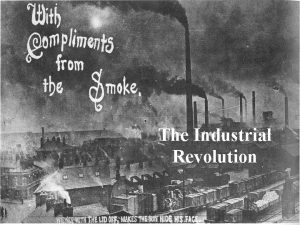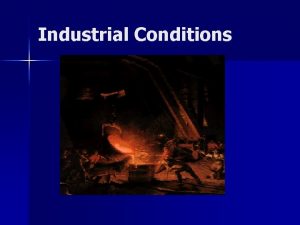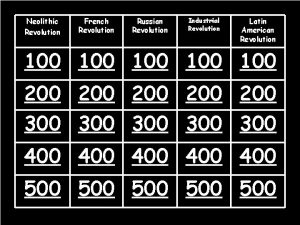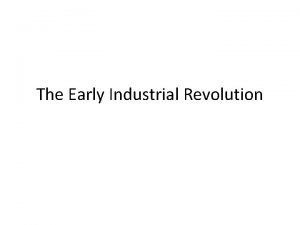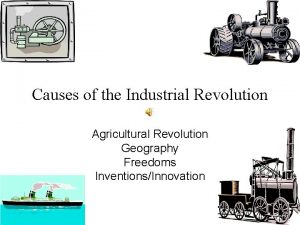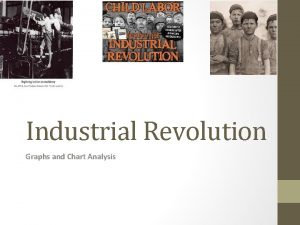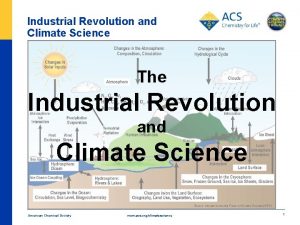The Industrial Revolution Causes and Outcomes Industrial Revolution















- Slides: 15

The Industrial Revolution Causes and Outcomes

Industrial Revolution Overview • By the mid to late 1700 s there was a shift towards manufactured good • The shift moved towards machines • Mass produced products • Lowered costs • Agricultural Revolution- new farming techniques led to higher yields • Crop rotation and seed drill • 2 waves of industrialization • 1 st wave (late 1700 s to mid 1800 s)= textiles • 2 nd wave (late 1800 s to early 1900 s)= steel, petroleum, electricity production, and expansion of railroads • By 1900 the industrialization spread from Europe to the United States • Makes the west the dominate region of the world

Industrial Revolution: England • Industrial Revolution began in England • Reasons Why • Large deposits of natural resources • Coal and Iron • Overseas empire provided resources • Also acted as markets for finished goods • Banks invested in inventions and industry • From 1750 to 1850 Britain was the most industrialized nation


Textile Industry and the rise of the Factory System • Large boom in textile industry due to the demand for these products • Increases a demand for cotton • Affects slavery in the United States • Eli Whitney's cotton gin increases production • Textile industry leads to the factory system • Power driven machines • Factories located along rivers • 1765 - James Watt invented the steam engine • allowed factories to be built in cities near the populations


New Modes of Transportation • Robert Fulton- steam engine • Railroads • Gave manufactures a cheap way to transport goods • New jobs for miners • Coal used to power the steam engines • Helped increased agricultural and fishing industries • Spurred tourism and helped bring people to the cities


Industrialization Outside Britain • Germany was political divided into smaller principalities • Lead to pockets of industrialization • Large deposits of coal and iron ore • By the mid-1800 s one of the worlds industrialized powers • United States • Cotton boom in the south lead to northern textile mills • Post Civil War- US becomes a leader in railroads, oil, steel, and electricity

Part 2: Outcomes

Dark side of Industrialization A. Negatives of the factory system • Factory work became less skilled • Conditions were dirty, dangerous, and unhealthy • Long hours (12 -16 hr day) • Workers were not paid well • Women & children were paid less than men • Owners required workers “clock in” & limited their breaks to increase production

• B. Child Labor • worked in factories, brickyards, or mines • poor families needed their kids to work • worked long hours in dangerous conditions, were often beaten • Child workers earned 10% of an adult wage • C. Changing Role of Women • poor women in cities worked in factories • Some women worked as domestic servants • Factory jobs required long hours • could leave women crippled, sick, or deformed • Women were paid ½ or ⅓ of a man’s salary


Response to the Industrialization • People wanted reforms • Reformers regulated water, food, sewage, and offered public education • Capitalism • Drove industrialization • Laissez-faire economics • By the mid to late 1800 s Britain and the US had passed child and women labor laws • Socialism • Regulated hours and wages • Communism • Workers organized in unions • Argued for more government control and regulation • Introduced by Karl Marx and Friedrich Engels • Wrote the Communist Manifest • Argued that the workers should have the rights

 Chapter 13 section 4 the power of the church
Chapter 13 section 4 the power of the church Causes of otto invades italy on pope's behalf
Causes of otto invades italy on pope's behalf Proximate cause and ultimate cause
Proximate cause and ultimate cause Animal behavior biology
Animal behavior biology Causes and effects of the russian revolution
Causes and effects of the russian revolution Causes and effects of french revolution
Causes and effects of french revolution Short term causes of the french revolution
Short term causes of the french revolution French revolution
French revolution Strengths of the continental army
Strengths of the continental army French revolution causes and effects
French revolution causes and effects French revolution causes and effects
French revolution causes and effects Long term causes french revolution
Long term causes french revolution What was the social cause of french revolution
What was the social cause of french revolution Effect of russian revolution
Effect of russian revolution Cause of neolithic revolution
Cause of neolithic revolution Russian revolution causes and effects
Russian revolution causes and effects
